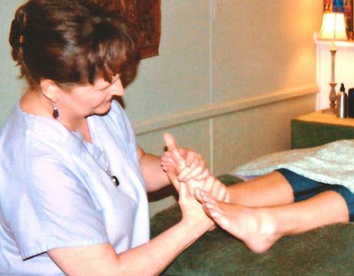Reflexology FAQ

What is a session like?
Your session begins with a warm foot soak followed by therapeutic reflexology, and then a soothing foot rub to blend it all together. If you are comfortable, I also balance the energy field surrounding the body and may incorporate reiki on occasion. My clients leave feeling light, energized and serene.
Is reflexology painful?
No. It can however be uncomfortable at times. During a session there may be specific reflex areas on your feet, hands or outer ears that are tender or sore. It is first determined if that tenderness is the result of a injury or a new pair of shoes. If not a reflexologist will take time to work this reflex until it becomes normalized- always keeping with in your comfort zone and answering any questions you may ask. A Reflexology session includes lots of very pleasant, relaxing techniques which by far outweigh any discomfort.
Is Reflexology safe during pregnancy?
Yes, mothers-to-be often find reflexology extremely helpful in coping with morning sickness, tiredness and symptoms associated with pregnanc such as swelling and tired feet.
How often should I have Reflexology?
All conditions and reactions are individual. You can safely enjoy Reflexology daily but that may not be preferred or realistic. Reflexology is cumulative, and regular sessions are optimal for best results. You are also encouraged to listen to your own intuition and how you feel about your process.
Some Rules of Thumb (no pun intended):
- Acute Conditions: One hour session three times in the first week. From there on, the number of sessions will be personalized. All conditions and reactions are individual
- Chronic and Particular Conditions: One or two sessions the first week and weekly sessions for 6 to 8 weeks.
- Maintaining your health: Full session once or twice a month.
Is reflexology safe for children and the elderly?
Yes! Children are generally very responsive to Reflexology. Even newborn babies respond well to Reflexology. With young children and the elderly, a treatment is often shorter and technique will vary.
Can people who are terminally ill benefit from Reflexology?
Yes. Depending on the clients condition the session my be shorter and technique may be adjusted. It can be extremely helpful in relaxing the client and helping them to cope with the emotional side of their illness and relieving pain.
Can I have reflexology during chemotherapy?
Yes. Reflexology helps the body to regain its balance. It works alongside the chemotherapy. Reflexology will help to relax the client and assist in the healing process. Many hospitals now recommend Reflexology for cancer patients. It is becoming common for a reflexologist to work in wellness centers, clinics, hospitals, and support groups.
What are the differences between reflexology and body work such as massage?
Reflexology and massage are not the same.
- Reflexology: affects the entire body by working the reflex maps on the feet, hands and outer ears. It assists all the systems of the body: muscular, circulatory digestive, reproductive. All bones, organs, muscles are affected: everything inside the head, inside the neck, inside the chest and inside the abdomen. During the use of EEG monitoring studies it is documented that reflexology has direct affect on the central nervous system of our bodies. In reflexology only footwear is removed, the client is fully clothed.
- Massage: When the entire body is massaged, there is muscle relaxation to the body’s muscular system. Improves circulation and reducing muscular tension. The client removes all clothing. Massage offers many relaxation and health benefits. However, it does not work directly with the brain and central nervous system. Massage and reflexology make a great combination!
Does a Refelxologist diagnose?
No. It is illegal for anyone who is not a licensed medical practitioner to diagnose. That applies to all complementary health care practices including Reflelxology. A reflexologist does NOT diagnose or prescribe.
Should I expect any side effects?
Most people feel comforted and relaxed after receiving reflexology. Others feel invigorated and full of energy. On occasion extra visits to the toilet, a slight headache, a runny nose, vivid dreams, chills or very sleepy. None of these symptoms will last for more than a day or so. Contact your reflexologist with any concerns and questions.
